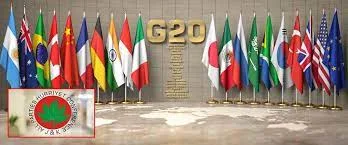Indian security agencies have flagged how Pakistan has been writing to countries, which are part of the Organisation of Islamic Cooperation (OIC), asking them to boycott the G20 tourism working group meeting in Srinagar scheduled for May 22-24. Saudi Arabia, China,Turkiyeand Pakistan boycotted the summit.
Other than expressing its protest on open forums about India holding a G20 meeting in Srinagar, Pakistan has shot off detailed letters to the OIC countries which are either part of the G20 or are special invitees to the meet, asking them to “boycott” it.
India's efforts to normalise its dubious annexation of held Kashmir have suffered a serious blow as a number of G20 countries have either refused to attend a tourism moot scheduled to begin in Srinagar on Monday, or have yet to commit to attending the event.
China has taken the lead in boycotting the event in the occupied region as its foreign ministry spokesperson said that his country “is firmly opposed to holding … meetings in disputed territory”. Moreover, Indian media has reported that Turkiye and Saudi Arabia, both G20 members, have yet to confirm participation while Egypt, which is not a member of the bloc but was invited as a guest, has also not yet registered for the event.
It is heartening to note that these nations have taken a brave step in solidarity with the oppressed people of held Kashmir. While Srinagar may be a picturesque locale for a tourism conference, the suffocating footprint of India’s occupation, and the blood of countless Kashmiris spilled by Indian forces, means that all conscientious nations should stay away from what is still internationally recognised as a disputed territory.
Reports from the occupied territory indicate that India is pulling out all the stops to ‘sanitise’ the situation. According to Mehbooba Mufti, former chief minister of IHK, India has unleashed “unprecedented … arrests, raids, surveillance and persecution” ahead of the G20 moot.
As the UN special rapporteur on minority rights recently noted, by organising the meeting in Srinagar, India sought to normalise “brutal and repressive denial” of rights of Kashmiri Muslims, while adding that the G20 was “unwittingly providing a veneer of support” to India’s violations of human rights in the disputed region.
India’s rulers arrogantly consider Kashmir to be a non-issue on the international agenda after they annexed the region in 2019. However, when powerful members of the G20 object to this normalisation of occupation, many in New Delhi will have a rude awakening.
While it is true that the international order is mainly governed by realpolitik and the absence of ethical guidelines, some global players are still willing to raise a voice for oppressed peoples around the world. What is particularly unfortunate is that G20’s Western members — who have been crying hoarse over Russia’s occupation of Ukraine — have gladly given their stamp of approval to India’s occupation of Kashmir.
Turkey, Indonesia and Saudi Arabia are members of the G20 and also of the OIC, a body of 57 countries. India’s special invitee countries include Bangladesh, Egypt, Nigeria, Oman and UAE, all members of the OIC. It remains to be seen how many of these heed to Pakistan’s request.
Pakistan claimed Jammu and Kashmir was an “internationally-recognised disputed territory” and cited resolutions of the UN Security Council (UNSC) and the OIC.
It referred to the abrogation of Article 370 and told the OIC countries that G20 meetings or events in Kashmir reflected “sheer disregard of relevant UNSC resolutions”. Sources said the UNSC resolutions mandated the first step for Pakistan was to vacate Pakistan-occupied Kashmir (PoK) and Gilgit-Baltistan. Pakistan feared that participation in the G20 meeting or events in Kashmir would lend “legitimacy” to India and had conveyed the same to OIC, the sources added.
Opposing events
Besides opposing the meet in Srinagar on open forums, Pakistan has shot off detailed letters to OIC countries which are either part of G20 or are special invitees, asking them to ‘boycott’ it.

